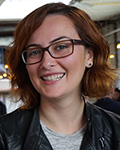2018
Burcu Baykurt
- Doctoral Candidate
- Columbia University

Abstract
This project is an ethnographic study of an experimental smart city—a city in which urban environments are augmented with sensors, wireless connectivity, and software for better city management. Beginning with a brief history of how technology companies have made a foray into urban environments since the 1990s, it then draws on three years of fieldwork in a large Midwestern smart city to demonstrate the ways the smart city stratifies civic ties and changes how social problems are identified in local governance. By following multiple communities’ encounters with digital infrastructures, it also shows how entrepreneurial residents, public officials, and low-income communities interpret, enact, and resist data-centric local governance. In doing so, it addresses larger issues about the intersections among urban inequality, the ideology of connectivity, and surveillance capitalism.

